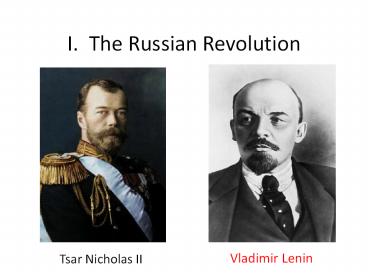I. The Russian Revolution - PowerPoint PPT Presentation
1 / 14
Title:
I. The Russian Revolution
Description:
Title: The Crisis of the Imperial Order Author: Alyson M. LeBlanc Created Date: 2/15/2006 6:29:27 PM Document presentation format: On-screen Show (4:3) – PowerPoint PPT presentation
Number of Views:313
Avg rating:3.0/5.0
Title: I. The Russian Revolution
1
I. The Russian Revolution
Tsar Nicholas II
Vladimir Lenin
2
A. Russian Civil War
- Russia largest army in world (1916 ran out of
supplies) - 2. Tsar Nicholas II lived in luxuryfamily
eventually executed - 3. February Revolution (1917) massive strikes
protests - - tsar abdicated throne
- - Provisional Government formed led by
Kerensky - Marxists emerge Bolsheviks led by V.I. Lenin
- - October Revolution (1917) Lenin takes power
- - 1918 Russia leaves WWI (lost 1/3 of territory)
3
The Romanov Family
4
B. New Economic Policy (N.E.P.)
- 1918 Russian Civil Warby 1921 Communist Red
Army wins - 1922 creation of the Union of Soviet Socialist
Republics (U.S.S.R.) - Russian economy in shambles
- Lenins New Economic Policy restored production
by relaxing government controls (Peace, Land,
Bread) - Death of Lenin (1924) struggle for power Leon
Trotsky forced out by Joseph Stalin
5
General Secretary of the Communist Party
Leninism
Politburo
Politburo
Committees
National Congress
Soviets
The Russian State from 1918 until 1989
6
(No Transcript)
7
C. German Civil War?
- brink of civil war in Germany (1923)
- - French occupied Ruhr Valley
- - severe hyperinflation
8
II. China Japan
9
A. Issues in the Far East
- Early 1900s China
- rapid population growth
- weakened Qing dynasty
- brutal warlords tax collectors
- devastating floods of Yellow River
- 2. Japan had few natural resources
- expansion
10
B. East Asia
- 1. China
- landlords
- wealthy merchants
- peasants
- foreigners
- 2. Japan
- industrialization aggravated social tensions
- urbanites against traditionalists
- wealthy zaibatsu (large companies) vs. poor
farmers
11
C. Chinese Revolutions (19001918)
- 1. Boxer Rebellion (Righteous Fists of Harmony)
1899-1901 anti-imperialist anti-Christian
movement - China defeated humiliated
- 2. Chinese Revolution (1911) revolution to
overthrow the Qing by Army mutiny - Sun Yat-sen elected as president of China
12
Last Emperor of China Puyi
13
D. Chinese Warlords
- Paris Peace Conference Japan controlled German
colonies in China - - riots in Beijing
- Chinas regional generals (warlords) plundered
taxed countryside - - treaty ports prospered
14
E. Chiang Kai-shek
- Sun Yat-sen welcomed members of the new Chinese
Communist Party (CCP) - Suns successor Chiang Kai-shek
- crushes regional warlords (1927)
- crushes Communist Party
- industrialization modernization
- corrupt administrators
- forced to Taiwan































